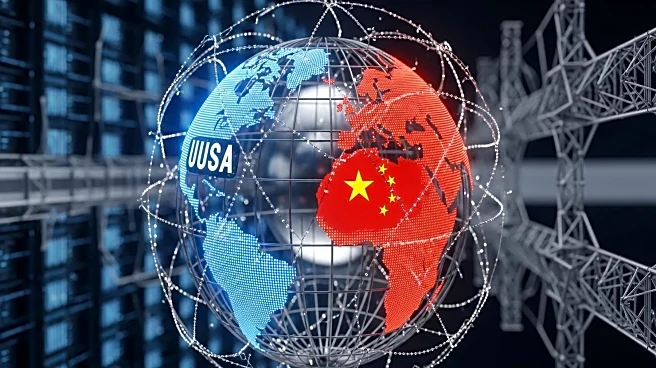What's Happening?
Indian equity markets opened cautiously amid escalating trade tensions between the US and China, which have affected global market sentiment. The Nifty 50 index held above 25,200 despite broad-based selling across sectors such as IT, metals, real estate, and PSU banks. At 09:50 a.m. IST, the Nifty 50 was down 59 points at 25,225, while the Sensex fell 230 points to 82,270. The Nifty Midcap index decreased by 0.2%, and the Smallcap index declined by 0.4%. Notable stock movements included Mahindra Lifespace gaining 2% due to a redevelopment project in Mumbai, while Avenue Supermarts shares fell 2% following subdued Q2 earnings. Waaree Renewable saw an 11% surge in its stock price after reporting a 117.4% increase in Q2 profits.
Why It's Important?
The ongoing trade tensions between the US and China are significant as they continue to influence global markets, including those in India. The decline in major indices like the Nifty and Sensex reflects investor concerns over the potential economic impact of these tensions. Sectors such as IT and metals, which are heavily reliant on international trade, are particularly vulnerable. The situation underscores the interconnectedness of global economies and the ripple effects that geopolitical conflicts can have on market stability. Companies with international exposure may face challenges, while those focused on domestic markets might find opportunities amid the volatility.
What's Next?
Market analysts are closely monitoring the situation for any signs of resolution between the US and China, which could stabilize global markets. Investors are advised to watch for key earnings reports, such as those from HCL Technologies, which could provide further insights into sector performance. Additionally, technical analysts have identified support and resistance levels for major indices, suggesting potential trading strategies. The broader market sentiment will likely remain cautious until clearer signals emerge regarding the trade tensions.
Beyond the Headlines
The trade tensions between the US and China could lead to long-term shifts in global trade policies and economic alliances. Countries may seek to diversify their trade partnerships to mitigate risks associated with geopolitical conflicts. This situation also highlights the importance of strategic planning for businesses with international operations, as they must navigate complex trade environments and adapt to changing regulations.









